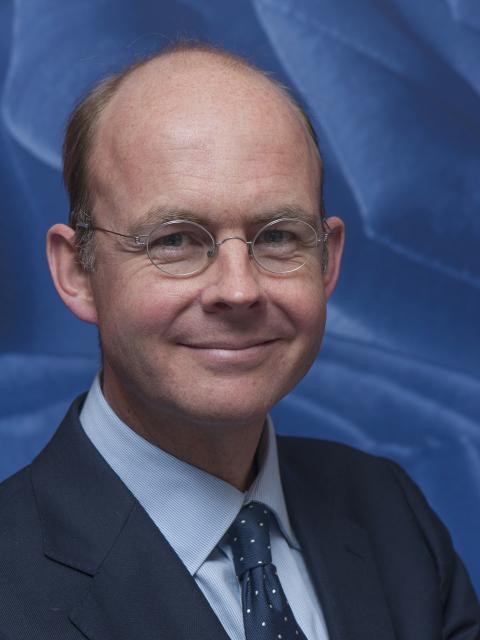Sometimes patients want a warm blanket instead of innovative medical technology
Innovative techniques have given doctors and surgeons more and more opportunities to cure people or enable them to live longer. However, if doctors rely too much on technology, too little attention may be paid to patients' questions about whether a medical procedure actually contributes to their quality of life. To ensure that treatment is aimed at improving patients’ lives, there should be a relationship of trust between doctors and patients. An interview with Patrick Vriens, vascular surgeon, who delivers his inaugural address on February 3. Vriens was appointed as an endowed Professor of Quality of Life in the Medical Setting in the Department of Medical and Clinical Psychology at Tilburg University last year.
How do you combine two such tough jobs?
(Laughs) 'I am 100 % surgeon, every day, and sometimes also at night, and in addition I work one day a week as a professor. Working at the university gives me an enormous amount of positive energy and many new ideas. It's great to work with young people who are full of questions and ambitions and to engage in discussion with people on campus. The questions I ask myself, as a surgeon, about quality of life gain more depth at the university. Hospital and university are an extension of one another. Nothing is as wonderful as spending a day on campus after a day in the operating theater.'
You elaborate on quality of life in your inaugural speech, what exactly do you mean by that?
'Medical science is constantly developing and innovating, we can do more and more to make people better. Doctors use that knowledge, but are used to thinking from their own frame of reference. The question is whether a treatment always makes sense and whether it truly contributes to a patient's quality of life. Look, I'm a vascular surgeon, if a patient has a leg with clogged veins, I can do bypass surgery to make sure the leg doesn't have to be amputated. But what does the patient think? I had a patient who said: "I've been to the hospital so many times for surgeries and angioplasty treatments, I became my leg! If I had known that before, I would have chosen to have the leg amputated and learn to walk with a prosthesis.' For a surgeon, of course, that feels terrible. But sometimes, as a doctor, you are obliged to do nothing.'

Doctors and patients need to exchange more knowledge about options and wishes of whether or not to treat?
'That's the beauty of taking quality of life as a point of departure. As a surgeon, you have to know what your patient wants. And very importantly, there has to be trust. Research on the quality of life can be done, but it is based on long, generic questionnaires. Moreover, these were devised by doctors and deal mainly with the patient’s state of health. But quality of life also means, for example, that a woman who has had breast cancer and had breast-conserving surgery through innovative techniques would still prefer to have a double mastectomy because her life is dominated by fear of cancer.
I argue that physicians need to have more soft skills. Availability, amiability and competence, in that order, those are core competencies in my view.
Those questionnaires are not enough?
‘Who decides what that quality of life is? The patient, of course. 'My colleague, philosopher Wim Dubbink, adds: the best version of the patient. Meaning that patients should not decide on the operating table whether a treatment is desirable. They have to think beforehand about what quality of life means for them. To do so, people need to know themselves, too. And so do doctors. What is important in my life? What would I want? And that relationship of trust between doctor and patient makes clear what they can expect from one another.'
That requires more effort from both.
'Certainly. In my speech, I argue that doctors need to have more soft skills. They need to be accessible, amiable, and competent, in that order, those are key competencies in my view. Someone who is there for patients, who cares for them, is friendly, courteous, with a hand on their shoulder. It's not just about treating a body with a disease, you have to look each other in the eye and manage expectations. And of course that doctor is innovative! For our programs we select people who have all these competencies. Technical skills alone won't get you there.
At the same time, the patient in turn has to think about his future. That's why I advocate prevention: healthy living. The best thing is doing as much as you can to stay out of the doctor’s office If you have arteriosclerosis, there is often more wear and tear elsewhere in the body, the nerves in your back, your joints start to hurt. You can then do a bypass and improve blood flow, but you cannot change the patient’s overall condition.'
Won't those extra efforts lead to more strain on healthcare personnel and thus to more expenditure in healthcare?
'Yes, it will take time. But make no mistake, because of those earlier exchanges of knowledge on the basis of trust, that expectation management, more people will choose not to be treated. As a doctor, you need to know your patient's context. Sometimes people don't want innovative technology, they just want a warm blanket.
So that means healthy behaviors, no smoking, exercising a lot, making life style choices. Those are not always easy, healthy eating is expensive for example, not everyone has money or space to exercise. We as doctors have a social responsibility to push for healthy living. Simple advice, for example, organize signs in buildings saying: take the stairs instead of the elevator.'
